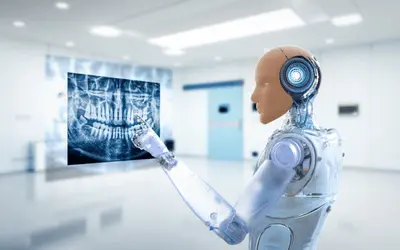Artificial intelligence (AI) inclusion into healthcare has changed illness diagnosis, treatment, and management. This technical development looks to improve patient care, simplify clinical procedures, and support creative medical research. Here is an in-depth look at how artificial intelligence is changing the healthcare scene.
1. Enhanced Diagnostics and Predictive Analytics
The remarkable power of AI lies in its capacity to swiftly and precisely analyze massive volumes of data, revolutionizing the field of diagnostics. Machine learning algorithms have the ability to analyze medical images and detect patterns and anomalies that may go unnoticed by humans. As an example, cutting-edge technology is now being utilized to identify potential cancer indicators in mammograms and detect retinal diseases through eye scans.
Predictive analytics is a field that has been greatly influenced by AI. Through the analysis of patient data, AI has the ability to anticipate disease outbreaks, patient decline, and potential treatment results. This enables a more proactive and personalized approach to healthcare, resulting in improved patient outcomes and cost reduction.
2. Personalized Treatment Plans
Thanks to AI, more personalized treatment plans are possible, which is great since every patient is unique. By analyzing individual patient data including genetics, lifestyle, and medical history, AI can help doctors personalize treatments to suit the specific needs of each patient. The treatment effectiveness is increased and the risk of unfavorable reactions and side effects is decreased with this approach.
3. Streamlining Administrative Tasks
Algorithms that make use of natural language processing (NLP) have the potential to be useful in tasks like transcribing medical notes, filling electronic health records (EHR), and handling billing. Through streamlining administrative processes, medical staff members can focus on delivering exceptional patient care and dedicating their efforts to providing high-quality treatment.
For example, natural language processing (NLP) algorithms can transcribe doctors’ notes, fill out electronic health records (EHRs), and even assist in coding and billing. This allows healthcare providers to focus more on patient care rather than paperwork.

Conclusion
The healthcare industry has experienced a major shift as a result of the integration of artificial intelligence. Several benefits have arisen from this, including enhanced diagnostics, personalized therapies, streamlined administrative processes, and accelerated medication development. The integration of artificial intelligence technologies into the healthcare industry has the power to revolutionize the sector. Our solutions are specifically crafted to revolutionize patient outcomes and enhance the efficiency of the healthcare system. This is happening because of the rapid advancement of AI technology.
The healthcare industry has been revolutionized by the power of artificial intelligence (AI), bringing about a new era of medical advancements and providing exceptional patient care. This is a highly encouraging development for the future of healthcare.
